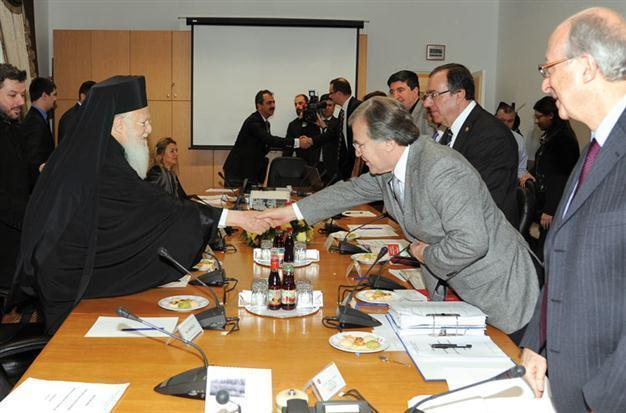Gov’t gives green light to opening of seminary
ISTANBUL / ANKARA - Hürriyet Daily News

Greek Orthodox Patriarch Bartholomew (L) shakes hands with former Parliament Speaker Mehmet Ali Şahin, who is a member of Parliament’s Constitutional Conciliation Commission, before presenting the patriarchate’s proposals for a new charter. AA photo
The government is not opposed to the opening of a seminary to raise Christian clerics provided it is subsumed under the authority of the Higher Education Board (YÖK), Deputy Prime Minister Bekir Bozdağ said yesterday.
“The theology faculties in Turkey are opened as a part of the universities and operate according to the rules of YÖK,” Bozdağ told Anatolia news agency. “There are no laws in Turkey against opening a seminary to raise Christian clerics, the state will also support such a move.”
Turkey’s Greek Orthodox have long demanded the re-opening of Halki Seminary on Istanbul’s Heybeliada island. In a recent meeting with Parliament’s Constitutional Conciliation Commission, Greek Orthodox Patriarch Bartholomew demanded a “constitutional guarantee for the domestic education of the clergy.”
Seminary’s status
The patriarchate seeks vocational school status for the seminary under the supervision of the Education Ministry.
Bozdağ said the government proposed to the Greek Orthodox Patriarchate that it open the seminary as a faculty of a university. “The main debate is on the status of the school , it is not about permission,” said Bozdağ. He gave the example of Germany, where all seminaries are part of universities, Bozdağ said.
The Greek Orthodox seminary was a main center of theological education for more than a century before Turkish authorities closed it in 1971 under a law designed to bring universities under state control. The international community, including the European Union and the United States, has long asked Turkey to reopen the seminary to prove its commitment to human rights.
In a patriarchate report presented to the parliamentary commission, the difficulty of educating the clergy within the framework of the present Constitution and laws was highlighted. The holy office also emphasized that because the Treaty of Lausanne was not fully implemented, the church was experiencing problems.
The patriarchate further outlined its problems on the religious education of minority community members and demanded constitutional guarantees on religious education. The patriarchate also emphasized that foundations of citizens and foundations of communities belonging to minority religions were another problematic area. The report also demanded that a new constitutional order be introduced on property issues.
Debate over Ecumenism heatıng up
VERCİHAN ZİFLİOĞLU / GÖKSEL BOZKURT
ISTANBUL / ANKARA - HDN
Greek Orthodox Patriarch Bartholomew’s demand at a parliamentary commission meeting last week that his patriarchate be entitled to become a legal entity has stirred up a new debate over the church’s ecumenism.
Granting the patriarchate such rights would change the whole situation for all patriarchates, especially the Greek Orthodox Patriarchate, Nationalist Movement Party (MHP) deputy Yusuf Halaçoğlu told the Hürriyet Daily News. “This right will especially strengthen the Greek Orthodox Patriarchate on the topic of their ecumenical claims.”
But Halaçoğlu also said the right to hold a legal personality should be granted reciprocally to Muslims in Greece, adding that Western Thrace’s mufti should enjoy this right.
Political science professor Baskın Oran, meanwhile, said ecumenism “is not a decision for Turkey to make.”
“It is related to the Orthodox theology. Legal entity is a right,” he said.
Another political science professor, Doğu Ergil, said the debate reflected a nationalist reflex and added that becoming a legal entity and forming a federation were rights.
“Ecumenism is a historic phenomenon,” he said. “Before the Turks even arrived in Anatolia, Anatolia was the center of Orthodoxy.”
There are only about 1,500 Greeks left in the country, Ergil said, pointing out that there was no tolerance even toward them.
Bartholomew also demanded that foundations should be able to gather under a federation. The Greek Orthodox Patriarchate needs to consult the Office of the Fatih District Governor for even the tiniest permission.
